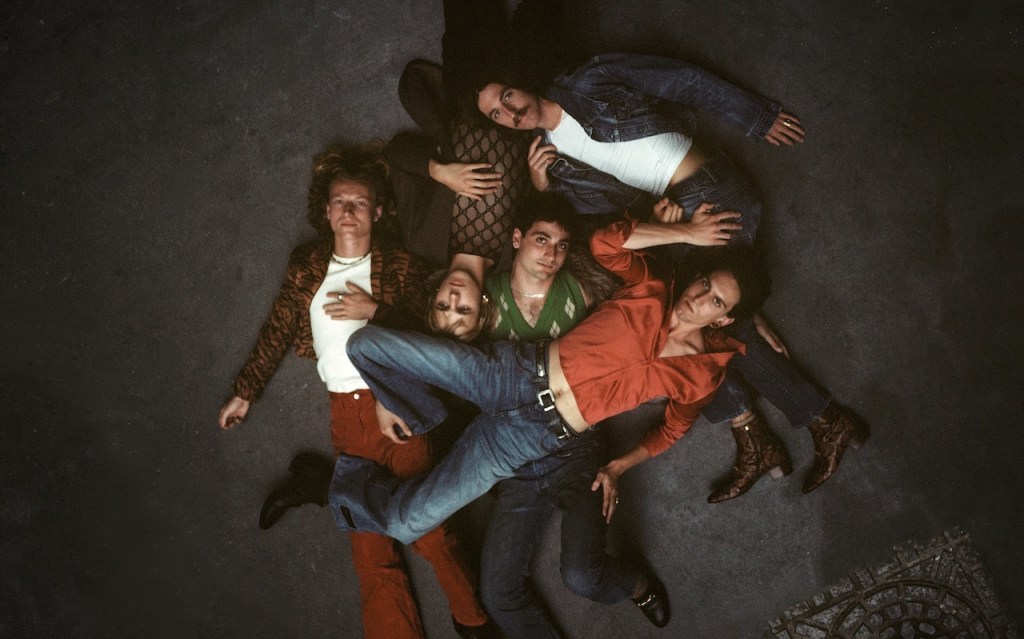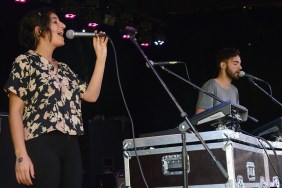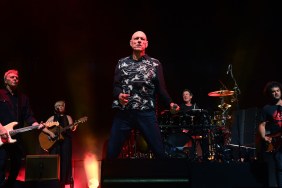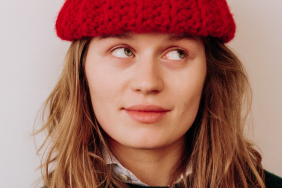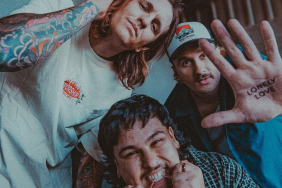Parcels’ album Day/Night is an ambitious exploration of duality. We say ambitious because the album is actually made up of two self-contained but complementary records. Whittled down from 150 demos, the final 19 tracks share a Yin-Yang relationship of light and shadow.
The lyrics consider and question opposing themes, including identity and anonymity, belonging and loneliness as well as family and independence. This symbiotic relationship means the singles carry weight on their own but hold greater meaning together. However, Parcels do warn that listening to Day/Night in one sitting isn’t for the faint-hearted and instead recommend enjoying each record separately.
This pairing of polar opposites also led Parcels to experiment with sounds beyond their comfort zone. To avoid being boxed in, they spent three months re-learning how to play their instruments in the studio. This creative bootcamp involved perfecting covers and cherry-picking techniques from genres spanning heavy metal and rock n’ roll to smooth jazz, R&B and folk.
The experimentation resulted in a genre-bending fusion they’ve coined ‘Cowboy Disco’. It’s a cocktail of cinematic strings, country-western tropes, funky guitar riffs and classic pop hooks. Whatever you wanna call it, it buoys the often anthemic harmonies beautifully and should make for a cracker of a live gig.
Dialling in to Berlin, Music Feeds caught up with Parcels drummer Antole Serret to chat about the creative process, shaking up their sound and why Day/Night was made for the stage.
Music Feeds: The band has described the creative process for ‘Day/Night’ as an emotional one. How are you feeling now that the world is about to hear it?
Anatole Serret: I’m not freaking out yet. It has been a process. We’ve had these albums for a while now. So I think my excitement for them was when we were finishing them, you know? Then it’s like months of meditating where we’re not allowed to talk about them. Now it’s this weird, emotional or mental thing where we suddenly have to talk about them. It’s like a ball has to start rolling again when all I wanted to do was talk about them.
MF: Yeah, I can imagine that must be a surreal but exciting experience.
AS: When they’re out, it will be huge. As much as I love the singles. I think with this album like we really created an album, or two albums. I’m worried that the singles don’t make sense without the context of the music around them. And I just prefer listening to records from start to finish. So I’ll be very excited when they’re out.
MF: The album explores the concept of dualities. How did that idea come about?
AS: We landed on it because of problems that we always have, where as soon as we do something, it seems like people want to be like, “Oh, that’s what they do”. And for our first record, it was like, “Oh, they’re a disco band”. And as much as I love disco, we don’t want to just be a disco band. And although that’ll always be a part of us, we love that ’70s groove music, we love the light and fluffy and kind of feel-good parts of the band, but as soon as that’s like the box you’re in, you’re like, “Ah, get me out of there!”. So there came this idea, I think Jules was the first one to mention it because we were at a gig at Coachella and, and he was like, “Imagine if there were two bands. Imagine if it was like Parcels, the light and fluffy one. And Parcels, the really dark, heavy one.”
So we had the idea of two bands that formed into the idea of doing two records that were opposing but also complemented each other. It was like that from the beginning. It wasn’t like we just had too many songs and we were like, “Oh, let’s put out two records”. From the start, we had these environments in which we wanted the songs to live. We didn’t ever want one of them to be more significant than the other. We didn’t want it to be like a pop album and then some ambient, experimental record. We wanted them to stand together and kind of talk about similar things but from different perspectives.
MF: So they coexist but can also stand independently.
AS: It’s funny actually, we realised it’s too much to listen from start to finish to both of them because, to us, there really are two albums. So if you buy the record, we’re recommending people to choose one and listen to it and then like the next day, choose another one. If you try and listen from start to finish, I think it’s too much (laughs). We’ve just received the records and we made sure that there were actually two separate records put in the same plastic sleeves. So when you open it, you actually end up getting like two albums. So it’s a little nod to people to listen to them separately.
MF: You and the band went back into the studio to “re-learn” how to play your instruments. What were some of the epiphanies you had during those sessions and how did they impact the record?
AS: Oh, man. Those were honestly some of the funnest months. We were in Australia, and we’ve been working on songs. Everyone had sent in their demos into a big folder, and we were listening to them. We were all living in this house in the rainforest that we rented for a couple months and set up all the instruments. And it was like, “Alright, it’s album time”. There wasn’t any date yet and it was just like, no pressure. That was a really beautiful experience. Everyone was becoming a lot more open and talking about their songs and what they meant. And we also talked a lot about what we could do to live with the concept. Then we came back to Berlin. There was a little hesitation because it was so nice in Australia, and a few of the boys really prefer living in Australia, I would say. I was a bit nervous to be back in Berlin and our studio is a lot smaller.
We were like, “okay, let’s just put all those songs on hold”. As musicians, we want to improve for this next record. The songwriting had improved but when we tried to play them, we were at the same level musically. So we were “Alright, we’re gonna be a cover band for a couple of months”. And with no intention of ever playing these covers to the world or playing them live, we were like “let’s look at music that we love, from all different genres”. And we went from metal, rock and roll to the blues. I think we started with BB King and then we did a lot of Earth, Wind & Fire. So we didn’t want to let go of the disco thing. We went into jazz, which I was so inspired by. Me and the piano player Patrick, we would listen to a lot of jazz which I can definitely hear in his piano playing. I feel like that really made its way into the album. I think we all got better as musicians in that time and we also got a lot better at listening to one another.
MF: You started with 150 demos, which you narrowed down to 40. What was the process of fine-tuning them down to the final 19?
AS: I think there were a lot of songs that we wanted to put on the record. I think it came in steps. There was a bigger batch that we played and really had a good go at. And before we went into the studio there was like, it kind of haunts me still to this day, this list of like eight tracks or nine tracks that we tried and we really had a go at arranging and producing them before recording and there was just something wrong.
They weren’t working as well as the other ones. And so at one point, no one wanted to be the one to say it, we agreed that we just have to put these songs aside because they’re not working and we’ve got so many songs. If there was a song that was already achieving a similar feeling on the record, it was like there wasn’t a huge reason to have both. It was quite an emotional thing for some of the boys that use writing music to get things out of their system.
MF: Parcels is known for putting on a killer show. How did the live performance impact the sound of the record?
AS: From the start of making these records, we’ve realised our strengths and our weaknesses. And playing live is something that people really love us as a band for. So we had the intention of going into the studio and recording everything live. And we didn’t do that with our first record and then we didn’t even know how to play with songs. I would play the drums and I recorded for three days. Then the bass player went in, I went into the control room, and we all worked on the bass and then we all worked on the keys and it was just this horrible thing.
I mean, we had so much fun and it was our first record and there were no bad feelings. But looking back like it’s a terrible way to make music (laughs). Once you’ve got all the layers you have this thing doesn’t really groove and then it was like “alright, time to go on tour, we need to learn how to play.”
So for this one and after the period of learning covers and listening to each other, we learned all of the songs and were really tight by the time we got into the studio. Then we’ve had some months in Australia and now we’re in the rehearsal room practising for these shows and all of this time has gone by, so we’re a really well-oiled machine. We got to learn all our songs. So we were really tight by the time we got into the studio. And then we’ve had like some months where we were in Australia and now we’re in the rehearsal room practising for these shows and it’s like all these times gone by and like, are like it really we were so well oiled by that point. And we’re really trying to get well oiled again.
MF: Are there any new tracks you’re especially excited to play live?
AS: We’re super excited. We haven’t been on stage in 18 months. I’m especially excited for the vocals. We’ve all been singing a lot and I want the vocals to be a focus of some sections. I feel like that’s also one of the beautiful things about this band is how we sing together and I want to highlight that in the live show.
–
